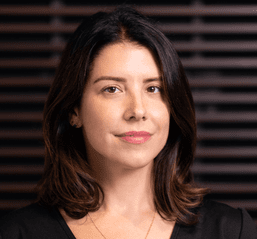
Close
result
Profile
Nicole Wilett
Chief of Staff at Open Society Foundations
Nicole Wilett,
Caroline Scotter Mainprize
3 min read


Holding the balance
Holding the balance
Caroline Scotter Mainprize talks to Nicole Wilett, Chief of Staff at Open Society Foundations, about power, authority, and the importance of purpose.
A clear sense of purpose and shared mission are ‘very easy to get out of bed for in the morning,’ says Nicole Wilett, Chief of Staff at Open Society Foundations, the philanthropic organisation that supports groups and individuals in more than 100 countries to promote democratic principles, human rights, and justice. But on the other hand, ‘the challenges that we’re looking at are so great and are so intertwined. Whether it's the rise of populism, the rise of extremism, climate change, disinformation, AI, the degradation of respect for human individual human rights, they are all interlinked. And even though, objectively speaking, we’ve got a tonne of resources to tackle them, they are also just a drop in the bucket when you think about the size of the problems. I think it's something that weighs heavily on anyone who does this kind of work, especially our grantees at the front line.’
Nicole has worked at Open Society Foundations for four years and has served under two different presidents, closely supporting them in both internal and external-facing work. ‘There’s a jack-of-all-trades quality to my work, as I think there is for most chiefs of staff,’ she says. ‘I think of myself as someone who works at the intersection of our operations and our programming to make the connection between our president – who is just one human being – and the many, many tentacles in our organisation that are all trying to move in the same direction.’
‘There’s a jack-of-all-trades quality to my work, as I think there is for most chiefs of staff.’
Like many chiefs of staff, Nicole fell into the role almost by accident. After a graduate degree in international public affairs specialising in Africa, she was awarded a Presidential Management Fellowship (a two-year training and leadership development programme) in the State Department. Over the next decade, this led to a variety of assignments in Washington and in several countries in Africa, the opportunity to serve in Congress, and to work at the White House under President Obama. It was, she says, ‘a really surround-sound experience of being in the Administration and in the US government’.
Having decided on a change of sector, Nicole helped lead the Africa practice of Albright Stonebridge Group, the late Madeleine Albright’s international consulting firm, and then worked for the Gates Foundation on priority advocacy and communications before joining Open Society Foundations.
She reflects: ‘I started as a specialist and grew over time into someone who was able to work in the private sector, the public sector and the philanthropic sector, and someone who could go from a very specific geography to broader and broader global challenges. But I think the shared thread through all of that was a sense of purpose and a sense of service. Becoming a chief of staff was exciting for me because of the fluidity of the role and the ability to work on so many different things. I feel that it drew on skill sets that I had learned over the years, and it turned out to be a great fit. I did not have an intentional strategic plan to get to this place, but in retrospect, I'm glad I got here.’

‘…the shared thread was a sense of purpose and a sense of service.’
The experience of transitioning between two principals led her to think deeply about dynamics of authority and power involved in the principal/chief of staff relationship. ‘One of the things that was most important was building trust with the new president, and part of that was being honest about where I thought the organisation was, but also picking my battles and knowing where other people were better placed to speak. I needed both to be the institutional memory that was going to support this new leader as well as give them the space to make their own mark on the organisation. It was a tough balancing act, but what made it possible was the absolute commitment that the president brought to the mission.’
Nicole’s advice to other chiefs of staff is also about maintaining balance. ‘You have to be conscious of the great power that there is in your access to the decision-maker. You are often the last person that decision-maker might talk to before they make their decision, and the person who’s going back and forth and fact-checking and considering different scenarios. Work and lives and jobs can all be affected by the things that you communicate. So I think there is a constant effort in acknowledging your own power and checking your own power and trusting the people around you to help you do that.’
Holding that balance can be a delicate task, and a strain on chiefs of staff because of the high visibility of the role. ‘It’s humbling. At any given moment you can be a champion to one part of the organisation because you've helped to elevate this amazing idea that they have and it's getting traction; and then on the other side of the organisation you’re a less welcome presence because you've had to step into something where they would have strongly preferred to have been left alone.’
‘It’s a tough, tough job,’ Nicole concludes, ‘but it's a great job, and one we’re all lucky to have.’

Author Bio
Nicole Wilett
Chief of Staff at
Open Society Foundations
Nicole Wilett is Chief of Staff at the Open Society Foundations, the largest independent funder of human rights in the world. Previously, she was Deputy Director for Program Advocacy and Communications at the Bill and Melinda Gates Foundation, leading the global gender equality and family planning strategies for Melinda French Gates’ priority work. Nicole was also Senior Vice President at the Albright Stonebridge Group, where she drove development of the firm’s Africa practice. In these roles, Nicole has drawn on the breadth of her experience within the U.S. government, the philanthropic community, and NGOs, where she has long focused on international democracy and governance, human rights, development, and security issues.
Nicole was Senior Advisor and Chief of Staff at the U.S. Embassy in South Africa. She has served in a variety of other capacities at the Department of State, including her long tenure in the Bureau of Democracy, Human Rights, and Labor, where she managed portfolios in South Asia and Africa and deployed to several U.S. missions. She was also a foreign policy fellow for Senator Hillary Clinton.
Nicole has an M.P.A. from Indiana University, where she also concentrated in African studies, and a B.A. from Syracuse University in psychology. She studied in Zimbabwe as an undergraduate.

Author Bio
Caroline Scotter Mainprize
Chief Editor
Caroline is a writer, editor, and communications advisor, working mostly for organisations involved in research and education. Clients have included Oxford University Press, Saïd Business School, Bayes Business School, and the international development and publishing organisation CABI. She has edited a number of books, annual reports, and journals, and written practitioner-focused research reports, including Oxford’s The Museum Leaders Report and Understanding Chief Digital Officers.Before freelancing she was responsible for the corporate communications at Oxford University Press. She had previously worked for a London PR consultancy and as a journalist on a business newspaper.








